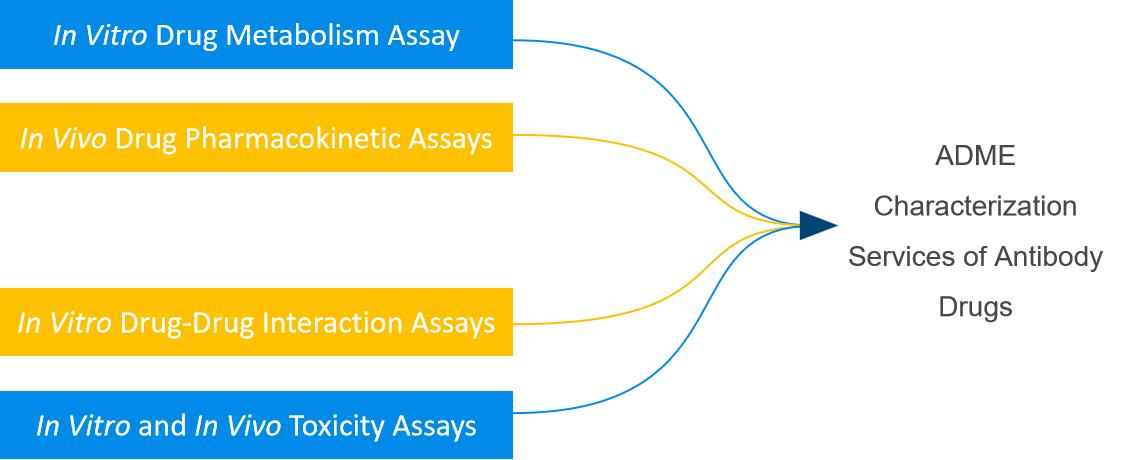ADME Characterization of Antibody Drugs
Online Inquiry
Antibody drugs, as a unique class of biotherapeutic drugs, have inherent heterogeneity and correspondingly complex absorption, distribution, metabolism and excretion (ADME) properties. Understanding the ADME properties of antibody drugs is critical to the development of clinically successful antibody drugs. Creative Proteomics provides comprehensive ADME characterization of antibody drugs, including in vivo and in vitro assays, to customers worldwide. Our service offers a comprehensive analysis of absorption, distribution, metabolism, and excretion parameters, providing you with valuable information to optimize the development of your antibody drug candidates.

Significance of ADME Characterization of Antibody Drugs
ADME stands for Absorption, Distribution, Metabolism, and Excretion, which are the key processes involved in the pharmacokinetics and toxicology of drugs. In the context of antibody drugs, ADME characterization focuses on evaluating how these therapeutic proteins are absorbed, distributed, metabolized, and eliminated in the body. This knowledge allows researchers to gain insights into how the drug behaves in different physiological systems, and helps in the selection and optimization of lead candidates for further development. Moreover, understanding the ADME properties of antibody drugs is crucial for assessing their safety, efficacy, and potential for drug-drug interactions.
Our ADME Characterization Services of Antibody Drugs
Our highly experienced team utilizes state-of-the-art techniques and advanced instrumentation to perform a range of ADME studies tailored to your specific demands. We offer a wide array of services, including but not limited to:
These assays help assess the metabolism and biotransformation pathways of antibody drugs. They provide valuable information on how the drugs are metabolized by enzymes in the body, such as cytochrome P450 enzymes. In vitro assays allow us to study the potential for drug-drug interactions, identify metabolites, and evaluate the susceptibility of drugs to metabolic degradation.
Pharmacokinetic studies involve investigating the time course of drug concentration in biological matrices following administration. We conduct in vivo studies in animal models to evaluate the absorption, distribution, metabolism, and excretion of antibody drugs. These studies provide valuable data on drug half-life, bioavailability, tissue distribution, and elimination kinetics.
Creative Proteomics utilizes in vitro assays to investigate the potential interactions between antibody drugs and a panel of commonly co-administered drugs. These assays include CYP inhibition assays, drug-drug transporter-mediated interaction assays, and more. These assays provide a comprehensive understanding of the drug's metabolism, as well as its potential to interact with other drugs through various metabolic pathways.
Safety evaluation is a crucial aspect of drug development. Our ADME characterization services include a wide range of in vitro and in vivo toxicity assays, including cell viability assays, genotoxicity assays, and acute toxicity studies, to evaluate the potential toxic effects of antibody drugs and identify its potential safety concerns.

Our ADME Characterization Analysis Technologies
At our facility, we have invested in cutting-edge technologies and equipment to ensure accurate and reliable results in ADME characterization. Our team of experienced scientists and researchers utilize a comprehensive range of assays and techniques to evaluate the behavior of antibody drugs in biological systems.
- In vitro cell-based assays: Assess the absorption, distribution, and metabolism of antibody drugs in various cell types and tissues, mimicking the physiological conditions of the human body.
- Liquid chromatography-mass spectrometry (LC-MS) and capillary electrophoresis (CE): Quantify and identify metabolites and degradation products of antibody drugs.
- Confocal microscopy and fluorescence imaging systems: Visualize and track the distribution and accumulation of antibody drugs within cells and tissues.
- Flow cytometry: Evaluation of antibody drug distribution within individual cells.
Creative Proteomics' experienced team of scientists will work closely with you to develop a customized study design that meets your specific requirements for comprehensive ADME characterization of your antibody drug. For more information or to request our services, please feel free to contact us.


